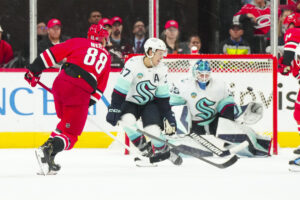The 2005 NHL lockout brought in sweeping changes to the game of hockey at its highest club level, not the least of which (and perhaps unforeseen by some) was the end of dynasties. While the Chicago Blackhawks and maybe L.A. Kings might argue the point, never again would we see a team dominate a decade like the Edmonton Oilers or Montreal Canadiens of old.
Instead, what emerged was a “window of opportunity” to win a championship and the concept of having steady waves of (cheap) young players at the ready to extend the window when veterans become too ineffective, or their contracts too bloated.
The Vancouver Canucks Flawed Ideological Construct
Fall From the Final
For the Vancouver Canucks, that window of opportunity was at it’s peak during the 2011 post-season, when the club had a better chance to win its first championship than ever before, but fell in seven games to the Boston Bruins in the Stanley Cup Final.
While the Canucks were able to capture a second consecutive President’s Trophy the following season, what followed was a series of playoff disappointments (they’ve won just three post-season games since that Game seven loss), an impatient fan base (attendance has dropped for three straight years and this season it is at its lowest since 2002) and in house drama (largely centered around star goalie Roberto Luongo) which played a large part in unraveling the club’s success.
As is tradition, the outgoing regime, namely former General Manager Mike Gillis, has taken a heavy portion of the blame for the current morass the club finds itself in, and rightfully so. While few would question Gillis’ ability to build a winner, failing to sustain that winning team and keep the window open proved to be his downfall.
Instead of making shrewd moves to augment the core with youth (as we’ve seen Stan Bowman in Chicago, Dean Lombardi in Los Angeles and, most recently, Pittsburgh Penguins General Manager Jim Rutherford do) Gillis instead gutted the system to bring in players which would help them win now. It worked… for a few seasons. But by then the core needed refreshing, and Gillis didn’t have the assets.
After the Window Closes
Unsurprisingly, incoming (and incumbent) General Manager Jim Benning and President of Hockey Operations Trevor Linden had a mess on their hands on April 9, 2014, the day Gillis was fired, and the window had effectively closed.
If everyone outside the franchise could see it, surely the minds within must have had some inkling when they took on this mess that the roster needed to be torn down. Instead they’ve preached a winning culture which will help further develop a strengthening prospect pool, reasoning players develop better in a winning environment. Specifically, they’ve kept the post-season as their goal.
While it’s a novel idea in theory, it’s like trying to get that beat-up old pick-up to the top of that last big hill; you just don’t have the horses. Daniel Sedin and Henrik Sedin, the thoroughbreds the franchise has been riding for years, are right where they are accustomed to being at the top of the club’s points parade. However Daniel has just seven in 14 games, while if a 36-year-old Henrik is leading the club in goals (as he is, with five) you know your offense is a wreck. Worse, there is no top line in the waiting – not yet, at least.
A Fruitless Search for Scoring
So with the Sedins clearly fading, how exactly has Canucks management tried to keep the club competitive? Veteran scorer Loui Eriksson was brought in to provide goals, but has so far been ineffective, scoring just once after 30 last season in Boston. Brandon Sutter was thought able to anchor the second line, with Benning going so far as to call him a “foundational” player, likewise has just one goal this season. Both were signed to large contracts before even playing for the club (Eriksson as a free agent), and both have fallen far below expectations, though time remains for them to prove their worth.
Vancouver management has also sought players in their early-mid 20’s with potential offensive upside, such as Sven Baertschi, Markus Granlund, Linden Vey and Emerson Etem. Unfortunately none of those gambles (which collectively cost the Canucks two valuable second round picks, plus Hunter Shinkaruk and Nicklas Jensen) have paid off. Baertschi has just one goal this year after 15 in 2015-16 and Granlund has scored just seven points in 30 games since being acquired from the Calgary Flames last season, while Vey and Etem are both lost assets.
Last Opportunity for a Rebuild
Simply put once again: The team just doesn’t have the horses up front to be competitive, so why do they insist on trying to sell wins, when everyone wants this club to be rebuilt? This fruitless search for scoring seems to be simply delaying the inevitable. In fact, this season may be the last opportunity for the club to actually execute a somewhat reasonable rebuild.
Goaltender Ryan Miller is approaching the end of his contract, and according to the Canucks presumptive goaltending succession plan, should be on the market for whatever the club can get. Winger Alexandre Burrows is also going UFA, and while his contract could make it difficult, Vancouver has to find any way to get an asset for him, as much as many fans would like to see him continue with the club in a reduced role.
Those options are easy, but the next two are not: Jannik Hansen and Alexander Edler. Speedy winger Hansen is the team’s top penalty killer, and one of it’s top offensive weapons (which is really saying something), while Edler is the club’s presumptive top pairing blueliner. However both are also 30 and their trade value will only go down from here.
Then of course their Chris Tanev, the crown jewel among Vancouver’s tradeable assets. At 26 years old, Tanev has become one of the best modern shut down defensemen in the league and carries a decent cap hit ($4.45 million). Why waste Tanev’s prime years when instead the club could add a quality (or perhaps top) prospect which could develop into someone who actually affects the club’s future success?
If management is truly committed to winning and ultimately capturing a Stanley Cup, it simply must make these difficult decisions and not stick to the flawed ideology which has led to this mess. Keeping a club’s window of opportunity open as long as possible is a balancing act, and the Canucks need to realize they’re not even on the wire. Worse, if they don’t realize it soon, there will be many dark days ahead for the club and its long-suffering fans.
Main Photo:






